- Home
- Anthony Trollope
An Old Man's Love Page 2
An Old Man's Love Read online
Page 2
CHAPTER II.
MR WHITTLESTAFF.
Mr Whittlestaff had not been a fortunate man, as fortune isgenerally counted in the world. He had not succeeded in what he hadattempted. He had, indeed, felt but little his want of success inregard to money, but he had encountered failure in one or two othermatters which had touched him nearly. In some things his life hadbeen successful; but these were matters in which the world does notwrite down a man's good luck as being generally conducive to hishappiness. He had never had a headache, rarely a cold, and not atouch of the gout. One little finger had become crooked, and he wasrecommended to drink whisky, which he did willingly,--because it wascheap. He was now fifty, and as fit, bodily and mentally, for hardwork as ever he had been. And he had a thousand a-year to spend, andspent it without ever feeling the necessity of saving a shilling. Andthen he hated no one, and those who came in contact with him alwaysliked him. He trod on nobody's corns, and was, generally speaking,the most popular man in the parish. These traits are not generallyreckoned as marks of good fortune; but they do tend to increase theamount of happiness which a man enjoys in this world. To tell ofhis misfortunes a somewhat longer chronicle of his life would benecessary. But the circumstances need only be indicated here. He hadbeen opposed in everything to his father's views. His father, findinghim to be a clever lad, had at first designed him for the Bar. Buthe, before he had left Oxford, utterly repudiated all legal pursuits."What the devil do you wish to be?" said his father, who at thattime was supposed to be able to leave his son L2000 a-year. The sonreplied that he would work for a fellowship, and devote himself toliterature. The old admiral sent literature to all the infernal gods,and told his son that he was a fool. But the lad did not succeed ingetting his fellowship, and neither father nor mother ever knew theamount of suffering which he endured thereby. He became plaintiveand wrote poetry, and spent his pocket-money in publishing it, whichagain caused him sorrow, not for the loss of his money, but by theobscurity of his poetry. He had to confess to himself that Godhad not conferred upon him the gift of writing poetry; and havingacknowledged so much, he never again put two lines together. Of allthis he said nothing; but the sense of failure made him sad at heart.And his father, when he was in those straits, only laughed at him,not at all believing the assurances of his son's misery, which fromtime to time were given to him by his wife.
Then the old admiral declared that, as his son would do nothing forhimself, he must work for his son. And he took in his old age togoing into the city and speculating in shares. Then the Admiraldied. The shares came to nothing, and calls were made; and whenMrs Whittlestaff followed her husband, her son, looking about him,bought Croker's Hall, reduced his establishment, and put down theman-servant whose departed glory was to Mrs Baggett a matter of suchdeep regret.
But before this time Mr Whittlestaff had encountered the greatestsorrow of his life. Even the lost fellowship, even the rejectedpoetry, had not caused him such misery as this. He had loved a younglady, and had been accepted;--and then the young lady had jilted him.At this time of his life he was about thirty; and as to the outsideworld, he was absolutely dumfounded by the catastrophe. Up to thisperiod he had been a sportsman in a moderate degree, fishing a gooddeal, shooting a little, and devoted to hunting, to the extent of asingle horse. But when the blow came, he never fished or shot, orhunted again. I think that the young lady would hardly have treatedhim so badly had she known what the effect would be. Her name wasCatherine Bailey, and she married one Compas, who, as years wenton, made a considerable reputation as an Old Bailey barrister. Hisfriends feared at the time that Mr Whittlestaff would do some injuryeither to himself or Mr Compas. But no one dared to speak to him onthe subject. His mother, indeed, did dare,--or half dared. But he soanswered his mother that he stopped her before the speech was outof her mouth. "Don't say a word, mother; I cannot bear it." And hestalked out of the house, and was not seen for many hours.
There had then, in the bitter agony of his spirit, come upon him anidea of blood. He himself must go,--or the man. Then he rememberedthat she was the man's wife, and that it behoved him to sparethe man for her sake. Then, when he came to think in earnest ofself-destruction, he told himself that it was a coward's refuge. Hetook to his classics for consolation, and read the philosophy ofCicero, and the history of Livy, and the war chronicles of Caesar.They did him good,--in the same way that the making of many shoeswould have done him good had he been a shoemaker. In catching fishesand riding after foxes he could not give his mind to the occupation,so as to abstract his thoughts. But Cicero's de Natura Deorum wasmore effectual. Gradually he returned to a gentle cheerfulness oflife, but he never burst out again into the violent exercise ofshooting a pheasant. After that his mother died, and again he wascalled upon to endure a lasting sorrow. But on this occasion thesorrow was of that kind which is softened by having been expected. Herarely spoke of his mother,--had never, up to this period at whichour tale finds him, mentioned his mother's name to any of those abouthim. Mrs Baggett would speak of her, saying much in the praise ofher old mistress. Mr Whittlestaff would smile and seem pleased, andso the subject would pass away. There was something too reverendto him in his idea of his mother, to admit of his discussing hercharacter with the servant. But he was well pleased to hear her thusdescribed. Of the other woman, of Catherine Bailey, of her who hadfalsely given herself up to so poor a creature as Compas, afterhaving received the poetry of his vows, he could endure no mentionwhatever; and though Mrs Baggett knew probably well the whole story,no attempt at naming the name was ever made.
Such had been the successes and the failures of Mr Whittlestaff'slife when Mary Lawrie was added as one to his household. The sameidea had occurred to him as to Mrs Baggett. He was not a young man,because he was fifty; but he was not quite an old man, because hewas only fifty. He had seen Mary Lawrie often enough, and had becomesufficiently well acquainted with her to feel sure that if he couldwin her she would be a loving companion for the remainder of hislife. He had turned it all over in his mind, and had been now eagerabout it and now bashful. On more than one occasion he had declaredto himself that he would be whipped if he would have anything todo with her. Should he subject himself again to some such agony ofdespair as he had suffered in the matter of Catherine Bailey? Itmight not be an agony such as that; but to him to ask and to bedenied would be a terrible pain. And as the girl did receive fromhis hands all that she had--her bread and meat, her bed, her veryclothes--would it not be better for her that he should stand to herin the place of a father than a lover? She might come to accept itall and not think much of it, if he would take before himself theguise of an old man. But were he to appear before her as a suitor forher hand, would she refuse him? Looking forward, he could perceivethat there was room for infinite grief if he should make the attemptand then things should not go well with him.
But the more he saw of her he was sure also that there was room forinfinite joy. He compared her in his mind to Catherine Bailey, andcould not but feel that in his youth he had been blind and fatuous.Catherine had been a fair-haired girl, and had now blossomed outinto the anxious mother of ten fair-haired children. The anxiety hadno doubt come from the evil courses of her husband. Had she beencontented to be Mrs Whittlestaff, there might have been no such lookof care, and there might perhaps have been less than ten children;but she would still have been fair-haired, blowsy, and fat. MrWhittlestaff had with infinite trouble found an opportunity of seeingher and her flock, unseen by them, and a portion of his agony hadsubsided. But still there was the fact that she had promised to behis, and had become a thing sacred in his sight, and had then givenherself up to the arms of Mr Compas. But now if Mary Lawrie wouldbut accept him, how blessed might be the evening of his life!
He had confessed to himself often enough how sad and dreary he wasin his desolate life. He had told himself that it must be so for theremainder of all time to him, when Catherine Bailey had declared herpurpose to him of marrying the successful young lawyer. He had atonce made up his mi
nd that his doom was fixed, and had not regardedhis solitude as any deep aggravation of his sorrow. But he had comeby degrees to find that a man should not give up his life because ofa fickle girl, and especially when he found her to be the mother often flaxen haired infants. He had, too, as he declared to himself,waited long enough.
But Mary Lawrie was very different from Catherine Bailey. TheCatherine he had known had been bright, and plump, and joyous, with aquick good-natured wit, and a rippling laughter, which by its silverysound had robbed him of his heart. There was no plumpness, and nosilver-sounding laughter with Mary. She shall be described in thenext chapter. Let it suffice to say here that she was somewhat staidin her demeanour, and not at all given to putting herself forward inconversation. But every hour that he passed in her company he becamemore and more sure that, if any wife could now make him happy, thiswas the woman who could do so.
But of her manner to himself he doubted much. She was gratitudeitself for what he was prepared to do for her. But with her gratitudewas mingled respect, and almost veneration. She treated him at firstalmost as a servant,--at any rate with none of the familiarity of afriend, and hardly with the reserve of a grown-up child. Gradually,in obedience to his evident wishes, she did drop her reserve,and allowed herself to converse with him; but it was always as ayoung person might with all modesty converse with her superior. Hestruggled hard to overcome her reticence, and did at last succeed.But still there was that respect, verging almost into veneration,which seemed to crush him when he thought that he might begin to playthe lover.
He had got a pony carriage for her, which he insisted that she shoulddrive herself. "But I never have driven," she had said, taking herplace, and doubtfully assuming the reins, while he sat beside her.She had at this time been six months at Croker's Hall.
"There must be a beginning for everything, and you shall begin todrive now." Then he took great trouble with her, teaching her how tohold the reins, and how to use the whip, till at last something offamiliarity was engendered. And he went out with her, day after day,showing her all those pretty haunts among the downs which are to befound in the neighbourhood of Alresford.
This did well for a time, and Mr Whittlestaff thought that he wasprogressing. But he had not as yet quite made up his mind that theattempt should be made at all. If he can be imagined to have talkedto a friend as he talked to himself, that friend would have averredthat he spoke more frequently against marriage,--or rather againstthe young lady's marriage,--than in favour of it. "After all it willnever do," he would have said to this friend; "I am an old man, andan old man shouldn't ask a young girl to sacrifice herself. MrsBaggett looks on it only as a question of butchers and bakers. Thereare, no doubt, circumstances in which butchers and bakers do comeuppermost. But here the butchers and bakers are provided. I wouldn'thave her marry me for that sake. Love, I fear, is out of thequestion. But for gratitude I would not have her do it." It was thusthat he would commonly have been found speaking to his friend. Therewere moments in which he roused himself to better hopes,--when he haddrank his glass of whisky and water, and was somewhat elate with theconsequences. "I'll do it," he would then have said to his friend;"only I cannot exactly say when." And so it went on, till at last hebecame afraid to speak out and tell her what he wanted.
Mr Whittlestaff was a tall, thin man, not quite six feet, with aface which a judge of male beauty would hardly call handsome, butwhich all would say was impressive and interesting. We seldomthink how much is told to us of the owner's character by thefirst or second glance of a man or woman's face. Is he a fool, oris he clever; is he reticent or outspoken; is he passionate orlong-suffering;--nay, is he honest or the reverse; is he maliciousor of a kindly nature? Of all these things we form a sudden judgmentwithout any thought; and in most of our sudden judgments we areroughly correct. It is so, or seems to us to be so, as a matter ofcourse,--that the man is a fool, or reticent, or malicious; and,without giving a thought to our own phrenological capacity, we passon with the conviction. No one ever considered that Mr Whittlestaffwas a fool or malicious; but people did think that he was reticentand honest. The inner traits of his character were very difficult tobe read. Even Mrs Baggett had hardly read them all correctly. He wasshamefaced to such a degree that Mrs Baggett could not bring herselfto understand it. And there was present to him a manner of speechwhich practice had now made habitual, but which he had originallyadopted with the object of hiding his shamefacedness under the veilof a dashing manner. He would speak as though he were quite freewith his thoughts, when, at the moment, he feared that thoughtsshould be read of which he certainly had no cause to be ashamed. Hisfellowship, his poetry, and his early love were all, to his thinking,causes of disgrace, which required to be buried deep within his ownmemory. But the true humility with which he regarded them betokened acharacter for which he need not have blushed. But that he thought ofthose matters at all--that he thought of himself at all--was a matterto be buried deep within his own bosom.
Through his short dark-brown hair the grey locks were beginning toshow themselves--signs indeed of age, but signs which were verybecoming to him. At fifty he was a much better-looking man than hehad been at thirty,--so that that foolish, fickle girl, CatherineBailey, would not have rejected him for the cruelly sensuous faceof Mr Compas, had the handsome iron-grey tinge been then given tohis countenance. He, as he looked at the glass, told himself that agrey-haired old fool, such as he was, had no right to burden the lifeof a young girl, simply because he found her in bread and meat. Thathe should think himself good-looking, was to his nature impossible.His eyes were rather small, but very bright; the eyebrows black andalmost bushy; his nose was well-formed and somewhat long, but not soas to give that peculiar idea of length to his face which comes fromgreat nasal prolongation. His upper lip was short, and his mouthlarge and manly. The strength of his character was better shown byhis mouth than by any other feature. He wore hardly any beard, asbeards go now,--unless indeed a whisker can be called a beard, whichcame down, closely shorn, about half an inch below his ear. "A verycommon sort of individual," he said of himself, as he looked in theglass when Mary Lawrie had been already twelve months in the house;"but then a man ought to be common. A man who is uncommon is either adandy or a buffoon."
His clothes were all made after one pattern and of one colour. Hehad, indeed, his morning clothes and his evening clothes. Those forthe morning were very nearly black, whereas for the evening they wereentirely so. He walked about the neighbourhood in a soft hat such asclergymen now affect, and on Sundays he went to church with the oldwell-established respectable chimney-pot. On Sundays, too, he carriedan umbrella, whereas on week-days he always had a large stick; and itwas observed that neither the umbrella nor the stick was adapted tothe state of the weather.
Such was Mr Whittlestaff of Croker's Hall, a small residencewhich stood half-way up on the way to the downs, about a mile fromAlresford. He had come into the neighbourhood, having bought a smallfreehold property without the knowledge of any of the inhabitants."It was just as though he had come out of the sun," said the oldbaker, forgetting that most men, or their ancestors, must have cometo their present residences after a similar fashion. And he hadbrought Mrs Baggett with him, who had confided to the baker that shehad felt herself that strange on her first arrival that she didn'tknow whether she was standing on her head or her heels.
Mrs Baggett had since become very gracious with various of theneighbours. She had the paying of Mr Whittlestaff's bills, and thegeneral disposal of his custom. From thence arose her popularity.But he, during the last fifteen years, had crept silently into thesociety of the place. At first no one had known anything about him;and the neighbourhood had been shy. But by degrees the parsons andthen the squires had taken him by the hand, so that the socialendowments of the place were more than Mr Whittlestaff even desired.

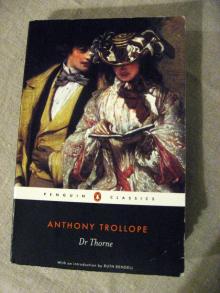 Doctor Thorne
Doctor Thorne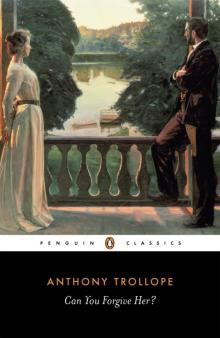 Can You Forgive Her?
Can You Forgive Her?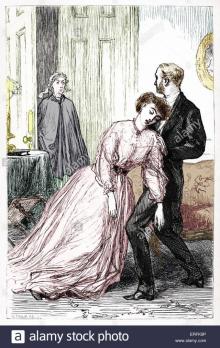 The Last Chronicle of Barset
The Last Chronicle of Barset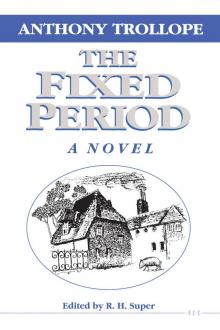 The Fixed Period
The Fixed Period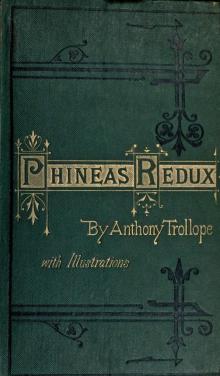 Phineas Redux
Phineas Redux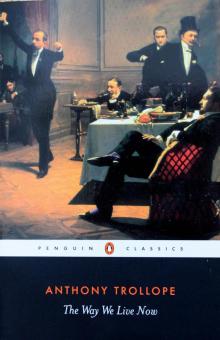 The Way We Live Now
The Way We Live Now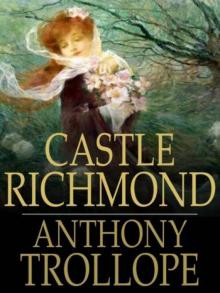 Castle Richmond
Castle Richmond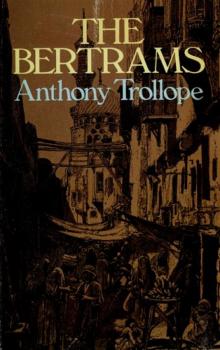 The Bertrams
The Bertrams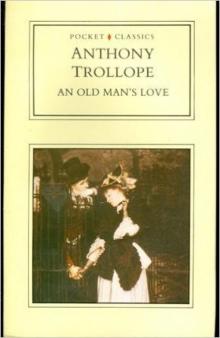 An Old Man's Love
An Old Man's Love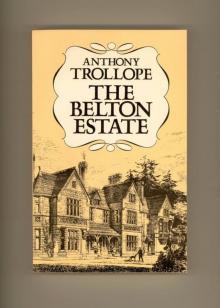 The Belton Estate
The Belton Estate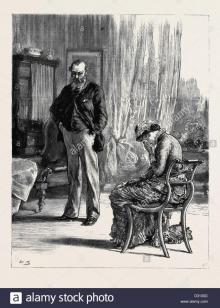 Marion Fay: A Novel
Marion Fay: A Novel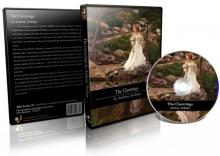 The Claverings
The Claverings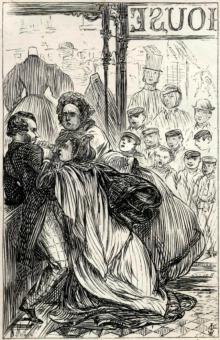 The Struggles of Brown, Jones, and Robinson
The Struggles of Brown, Jones, and Robinson Nina Balatka
Nina Balatka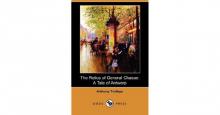 The Relics of General Chasse: A Tale of Antwerp
The Relics of General Chasse: A Tale of Antwerp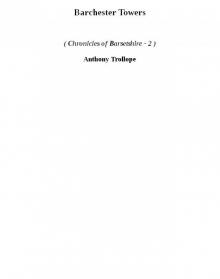 Barchester Towers cob-2
Barchester Towers cob-2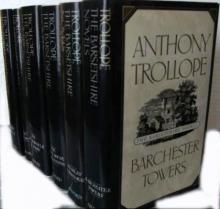 The Chronicles of Barsetshire
The Chronicles of Barsetshire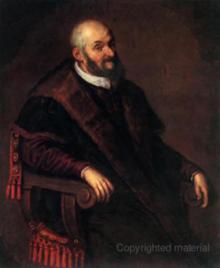 The Warden cob-1
The Warden cob-1 Framley Parsonage
Framley Parsonage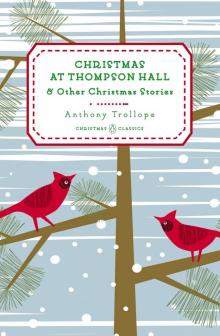 Christmas at Thompson Hall
Christmas at Thompson Hall The Warden
The Warden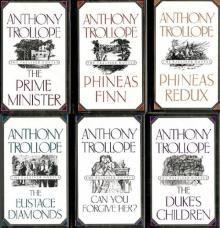 The Palliser Novels
The Palliser Novels The Small House at Allington
The Small House at Allington Barchester Towers
Barchester Towers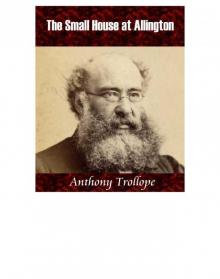 The Small House at Allington cob-5
The Small House at Allington cob-5 The Duke's Children
The Duke's Children Phineas Finn, the Irish Member
Phineas Finn, the Irish Member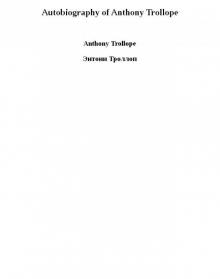 Autobiography of Anthony Trollope
Autobiography of Anthony Trollope